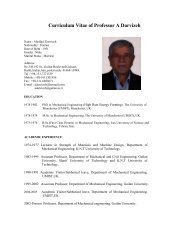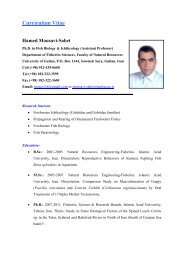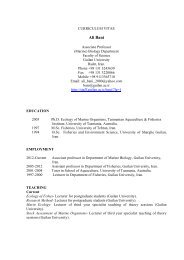Medical Tourism in Developing Countries
Medical Tourism in Developing Countries
Medical Tourism in Developing Countries
- No tags were found...
You also want an ePaper? Increase the reach of your titles
YUMPU automatically turns print PDFs into web optimized ePapers that Google loves.
24 ● <strong>Medical</strong> <strong>Tourism</strong> <strong>in</strong> Develop<strong>in</strong>g <strong>Countries</strong>nature of exchange, specialization, and communication between economicentities. Dur<strong>in</strong>g globalization, a concentration of power <strong>in</strong> the hands ofcorporations has undoubtedly occurred. Participation <strong>in</strong> the global economydecreases the power of state governments to control their own economicdest<strong>in</strong>ies as a collective economic dest<strong>in</strong>y becomes global. Moreover, globalizationgives populations across the world greater exposure to differentpeoples, values, and habits. Communications, media, and the Internet crossboundaries, as do people who come <strong>in</strong>to contact with foreigners when theytravel to foreign lands. Thus, it comes as no surprise that globali zationaffects the health sector, the tourist sector, and therefore also medicaltourism.With respect to health, globalization helps spread communicable diseasesas more than two million people cross <strong>in</strong>ternational borders every day. 20Increased trade <strong>in</strong> live animals and animal products has <strong>in</strong>creased the spreadof foodborne diseases (such as mad cow disease) and also trade <strong>in</strong> cigarettesand tobacco products has <strong>in</strong>creased. A WHO study noted that globalizationaffects health and health affects globalization. 21 It affects health <strong>in</strong>sofar asit enables economic growth, which <strong>in</strong> some cases reduces poverty (which isclearly tied to health issues). At the same time, poor public health preventsa country from be<strong>in</strong>g <strong>in</strong>corporated <strong>in</strong>to the global economy as it keepsproductivity low.Tourists represent globalization par excellence as there is consensus <strong>in</strong> thesocial science literature that the l<strong>in</strong>k between tourism and globalization isstrong. Donald Reid said that tourism is one of the ma<strong>in</strong> products be<strong>in</strong>gglobalized while Frances Brown argued that it is one of the ma<strong>in</strong> forces driv<strong>in</strong>gglobalization. 22 Accord<strong>in</strong>g to John Lea, “There is no other <strong>in</strong>ternationaltrad<strong>in</strong>g activity which <strong>in</strong>volves such critical <strong>in</strong>terplay among economic,political, environmental, and social elements as tourism.” 23 Thus, throughconsumption, production, and <strong>in</strong>vestment of tourist goods and services, eventhe poorest third world countries become l<strong>in</strong>ked to the global economy.Therefore, both health and tourism are an <strong>in</strong>tegral part of transnationaleconomic activity associated with globalization. The cross between them,namely medical tourism, is thus also a part of globalization <strong>in</strong>sofar as it isenabled by it and, by its very nature, re<strong>in</strong>forces further globalization.Increas<strong>in</strong>g Importance of ServicesIn the last two decades of the twentieth century, services have emerged asthe largest and fastest grow<strong>in</strong>g sector <strong>in</strong> the world. It is responsible for some60 percent of global output and an even greater share of employment. Inmany countries, these numbers are much higher.
















